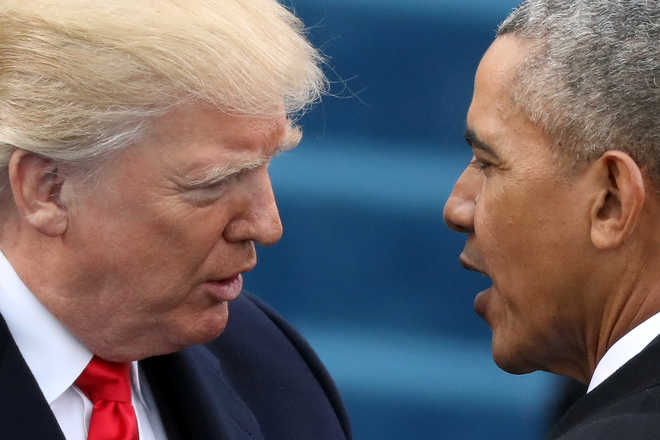WASHINGTON, March 4
US President Donald Trump on Saturday accused former president Barack Obama of wire tapping him in October during the late stages of the presidential election campaign, but offered no evidence to support the allegation.
"How low has President Obama gone to tapp my phones during the very sacred election process. This is Nixon/Watergate. Bad (or sick) guy!," Trump said in a series of Tweets on his Twitter account early on Saturday.
Obama's office did not immediately respond to a request for comment from Reuters.
In one of the Tweets, Trump said the alleged wire tapping took place in his Trump Tower skyscraper in New York, but there was "nothing found".
Trump's administration has come under pressure from FBI and congressional investigations into contacts between some members of his campaign team and Russian officials during his campaign.
Obama imposed sanctions on Russia and ordered Russian diplomats to leave the US in December over the country's involvement in hacking political groups in the November 8 US presidential election.
Trump's national security adviser, Michael Flynn, resigned in February after revelations that he had discussed US sanctions on Russia with the Russian ambassador to the United States before Trump took office.
Flynn had promised Vice-President Mike Pence he had not discussed US sanctions with the Russians, but transcripts of intercepted communications, described by US officials, showed that the subject had come up in conversations between him and the Russian ambassador.
Trump has often used his Twitter account to attack rivals and for years led a campaign alleging that Obama was not born in the US. He later retracted the allegation.
Waiver on Russian deal
Facing a new wave of questions about his ties to Russia, Trump is telling advisers and allies that he may shelve at least temporarily his plan to pursue a deal with Moscow on the Islamic State group and other national security matters, according to administration officials and Western diplomats.
In conversations with diplomats and other officials, Trump and his aides have ascribed the new thinking to Moscow's recent provocations.
But the reconsideration of a central tenet of the president's foreign policy underscores the growing political risks in forging closer relations with Russia, as long as the FBI investigates his campaign associates' connections to Moscow and congressional committees ramp up their probe of Russia's meddling in the 2016 election.
Trump's new skepticism about brokering a deal with Moscow also suggests the rising influence of a new crop of advisers who have taken a tougher stance on Russia, including Defense Secretary Jim Mattis and new national security adviser HR McMaster.
During his first meeting with National Security Council staff, McMaster described Russia, as well as China, as a country that wants to upend the current world order, according to an administration official who attended the meeting.
Michael McFaul, who served as President Barack Obama's ambassador to Russia, said that while Trump has been open about wanting warmer relations with Russia, "he hasn't picked people to the best of my knowledge at senior levels that share that view".
European allies also have been pushing the Trump administration not to make any early concessions to Russia. To bolster their case, European officials have been tailoring their rhetoric to appeal to Trump's business background, including emphasising the risks of negotiating a bad deal, rather than more nuanced arguments, according to one Western diplomat.
Given Trump's "America First" mantra, foreign officials emphasise how US standing in the world could be diminished by making concessions to Russia instead of focusing on the importance of the US and Europe sticking together to counter Moscow.
Trump, who spoke favorably about Russian President Vladimir Putin throughout the campaign, is said to have shown interest in a broad deal with Russia that could address cooperation in fighting the Islamic State, nuclear arms control agreements and Russia's provocations in Ukraine. — Reuters/ AP
Unlock Exclusive Insights with The Tribune Premium
Take your experience further with Premium access.
Thought-provoking Opinions, Expert Analysis, In-depth Insights and other Member Only Benefits
Already a Member? Sign In Now











